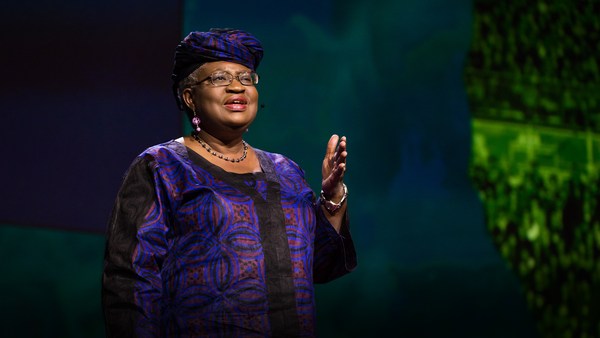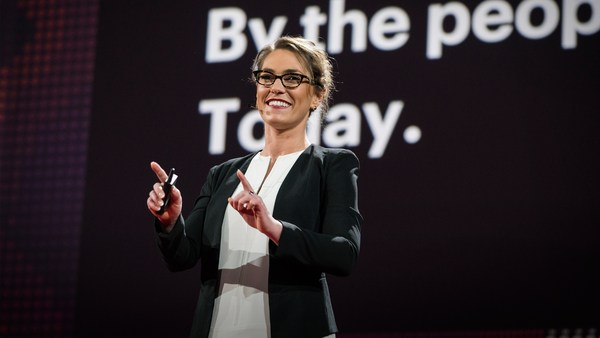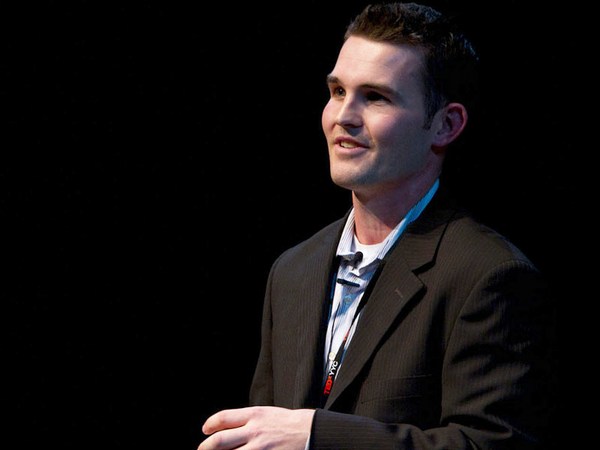Growing up in Kenya, I knew I always wanted to study biochemistry. See, I had seen the impact of the high prevalence of diseases like malaria, and I wanted to make medicines that would cure the sick. So I worked really hard, got a scholarship to the United States, where I became a cancer researcher, and I loved it. For someone who wants to cure diseases, there is no higher calling.
Ten years later, I returned to Kenya to do just that. A freshly minted PhD, ready to take on this horrific illness, which in Kenya was almost certainly a death sentence. But instead of landing a job in a pharmaceutical company or a hospital, I found myself drawn to a different kind of lab, working with a different kind of patient -- a patient whose illness was so serious it impacted every single person in my country; a patient who needed to get healthy fast. That patient was my government.
(Laughter)
See, many of us will agree that lots of governments are unhealthy today.
(Laughter)
(Applause)
And Kenya was no exception. When I returned to Kenya in 2014, there was 17 percent youth unemployment. And Nairobi, the major business hub, was rated 177th on the quality of living index. It was bad.
Now, an economy is only as healthy as the entities that make it up. So when government -- one of its most vital entities -- is weak or unhealthy, everyone and everything suffers. Sometimes you might put a Band-Aid in place to try and temporarily stop the pain. Maybe some of you here have participated in a Band-Aid operation to an African country -- setting up alternative schools, building hospitals, digging wells -- because governments there either weren't or couldn't provide the services to their citizens.
We all know this is a temporary solution. There are just some things Band-Aids can't fix, like providing an environment where businesses feel secure that they'll have an equal opportunity to be able to run and start their businesses successfully. Or there are systems in place that would protect the private property that they create. I would argue, only government is capable of creating these necessary conditions for economies to thrive.
Economies thrive when business are able to quickly and easily set up shop. Business owners create new sources of income for themselves, new jobs get added into the economy and then more taxes are paid to fund public projects. New business is good for everyone. And it's such an important measure of economic growth, the World Bank has a ranking called the "Ease of Doing Business Ranking," which measures how easy or difficult it is to start a business in any given country. And as you can imagine, starting or running a business in a country with an ailing government -- almost impossible.
The President of Kenya knew this, which is why in 2014, he came to our lab and asked us to partner with him to be able to help Kenya to jump-start business growth. He set an ambitious goal: he wanted Kenya to be ranked top 50 in this World Bank ranking. In 2014 when he came, Kenya was ranked 136 out of 189 countries. We had our work cut out for us.
Fortunately, he came to the right place. We're not just a Band-Aid kind of team. We're a group of computer scientists, mathematicians, engineers and a cancer researcher, who understood that in order to cure the sickness of a system as big as government, we needed to examine the whole body, and then we needed to drill down all the way from the organs, into the tissues, all the way to single cells, so that we could properly make a diagnosis.
So with our marching orders from the President himself, we embarked on the purest of the scientific method: collecting data -- all the data we could get our hands on -- making hypotheses, creating solutions, one after the other.
So we met with hundreds of individuals who worked at government agencies, from the tax agency, the lands office, utilities company, the agency that's responsible for registering companies, and with each of them, we observed them as they served customers, we documented their processes -- most of them were manual. We also just went back and looked at a lot of their previous paperwork to try and really understand; to try and diagnose what bodily malfunctions had occurred that lead to that 136th spot on the World Bank list.
What did we find? Well, in Kenya it was taking 72 days for a business owner to register their property, compared to just one day in New Zealand, which was ranked second on the World Bank list. It took 158 days to get a new electric connection. In Korea it took 18 days. If you wanted to get a construction permit so you could put up a building, in Kenya, it was going to take you 125 days. In Singapore, which is ranked first, that would only take you 26 days. God forbid you had to go to court to get help in being able to settle a dispute to enforce a contract, because that process alone would take you 465 days. And if that wasn't bad enough, you would lose 40 percent of your claim in just fees -- legal fees, enforcement fees, court fees.
Now, I know what you're thinking: for there to exist such inefficiencies in an African country, there must be corruption. The very cells that run the show must be corrupt to the bone. I thought so, too, actually. When we started out, I thought I was going to find so much corruption, I was literally going to either die or get killed in the process.
(Laughter)
But when we dug deeper, we didn't find corruption in the classic sense: slimy gangsters lurking in the darkness, waiting to grease the palms of their friends. What we found was an overwhelming sense of helplessness. Our government was sick, because government employees felt helpless. They felt that they were not empowered to drive change. And when people feel stuck and helpless, they stop seeing their role in a bigger system. They start to think the work they do doesn't matter in driving change. And when that happens, things slow down, fall through the cracks and inefficiencies flourish.
Now imagine with me, if you had a process you had to go through -- had no other alternative -- and this process was inefficient, complex and very, very slow. What would you do? I think you might start by trying to find somebody to outsource it to, so that they can just take care of that for you. If that doesn't work, maybe you'd consider paying somebody to just "unofficially" take care of it on your behalf -- especially if you thought nobody was going to catch you. Not out of malice or greed, just trying to make sure that you get something to work for you so you can move on. Unfortunately, that is the beginning of corruption. And if left to thrive and grow, it seeps into the whole system, and before you know it, the whole body is sick.
Knowing this, we had to start by making sure that every single stakeholder we worked with had a shared vision for what we wanted to do. So we met with everyone, from the clerk whose sole job is to remove staples from application packets, to the legal drafters at the attorney general's office, to the clerks who are responsible for serving business owners when they came to access government services. And with them, we made sure that they understood how their day-to-day actions were impacting our ability as a country to create new jobs and to attract investments. No one's role was too small; everyone's role was vital.
Now, guess what we started to see? A coalition of government employees who are excited and ready to drive change, began to grow and form. And together we started to implement changes that impacted the service delivery of our country.
The result? In just two years, Kenya's ranking moved from 136 to 92.
(Applause)
And in recognition of the significant reforms we've been able to implement in such a short time, Kenya was recognized to be among the top three global reformers in the world two years in a row.
(Applause)
Are we fully healthy? No. We have some serious work still to do. I like to think about these two years like a weight-loss program.
(Laughter)
It's that time after months of hard, grueling work at the gym, and then you get your first time to weigh yourself, and you've lost 20 pounds. You're feeling unstoppable.
Now, some of you may think this doesn't apply to you. You're not from Kenya. You don't intend to be an entrepreneur. But think with me for just a moment. When is the last time you accessed a government service? Maybe applied for your driver's license, tried to do your taxes on your own. It's easy in this political and global economy to want to give up when we think about transforming government. We can easily resign to the fact or to the thinking that government is too inefficient, too corrupt, unfixable. We might even rarely get some key government responsibilities to other sectors, to Band-Aid solutions, or to just give up and feel helpless. But just because a system is sick doesn't mean it's dying. We cannot afford to give up when it comes to the challenges of fixing our governments.
In the end, what really makes a government healthy is when healthy cells -- that's you and I -- get to the ground, roll up our sleeves, refuse to be helpless and believe that sometimes, all it takes is for us to create some space for healthy cells to grow and thrive.
Thank you.
(Applause)





